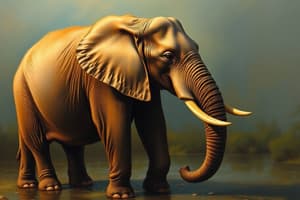Podcast
Questions and Answers
What is the primary role of zoos when it comes to elephants?
What is the primary role of zoos when it comes to elephants?
- Maintaining a healthy population in captivity (correct)
- Conducting scientific research on elephants
- Educating the public about elephants
- Providing recreational opportunities
Which gender of elephants typically leaves their natal group upon reaching adolescence?
Which gender of elephants typically leaves their natal group upon reaching adolescence?
- Males (correct)
- Females
- Both males and females
- None of the above
What kind of social structure do elephant families typically have outside of zoos?
What kind of social structure do elephant families typically have outside of zoos?
- Equalitarian
- Hierarchical based on size (correct)
- Matriarchal
- Patriarchal
Which of the following is NOT a role that zoos play in relation to elephants?
Which of the following is NOT a role that zoos play in relation to elephants?
Why is research considered an essential aspect of zoos in relation to elephants?
Why is research considered an essential aspect of zoos in relation to elephants?
What is the main purpose of zoos according to the text?
What is the main purpose of zoos according to the text?
How long do elephants generally live in the wild?
How long do elephants generally live in the wild?
What is the primary function of an elephant's trunk?
What is the primary function of an elephant's trunk?
Where do elephants live in the wild?
Where do elephants live in the wild?
What do captive elephants eat?
What do captive elephants eat?
Flashcards are hidden until you start studying
Study Notes
Zoo Animals - Focusing on Elephants
Zoos are enclosed spaces where people can observe wild animals up close. They can serve several purposes, including education, conservation, research, and recreation. One of the main attractions that zoos offer are elephants, which are both fascinating creatures and important representatives of their ecosystems. This article will provide an overview of elephants and their role in zoos.
Elephant Overview
Description and Characteristics
Elephants are large mammals with a thick gray skin which helps them to shed dust on themselves and to protect them from the sun. They have long trunks (5-6 feet or 1.5-1.8 meters), which they use for grabbing food, drinking water, and holding objects. Their trunk can also function like a hand to pick up small items, touch others, and even shoot out streams of smelly water. Elephants live for about 60 years in the wild while in captivity they may live up to 80 years.
Habitat and Diet
Elephants live in various regions across Africa and Asia, such as savannas, forests, mountains, deserts, swamps, grasslands, and marshes. In the wild, they eat leaves, fruits, roots, stems, and bark. Captive elephants are fed with hay, vegetables, and pellets as well as water in large quantities due to their high metabolic rate.
Reproduction and Social Structure
In most places outside zoos, elephant families have a hierarchical social structure based on sex, age, and seniority in which older females dominate younger ones. Males tend to leave their natal group when they reach adolescence while females usually stay together in matriarchal groups until death. This behavior has been documented in both Asian and African elephants.
Role in Zoos
Zoos play several roles when it comes to elephants:
Conservation
Conservation is one of the primary roles of zoos. They strive to maintain a healthy population of elephants in captivity, keeping genetic diversity high, and providing them with a safe environment. Some zoos are actively involved in breeding programs on behalf of the Species Survival Plan (SSP) of the Association of Zoos and Aquaria (AZA) to maintain healthy populations of elephants and to protect them from extinction.
Education
Education is another key role of zoos. They provide opportunities for visitors to learn about elephants and their habitats. Through exhibits, programs, and events, zoos introduce people to various aspects of elephant biology, behavior, and ecology.
Research
Research is an essential aspect of zoos, and it allows them to contribute to broader knowledge about elephants. For example, zoos conduct research on elephant health, behavior, and reproductive biology. These studies can inform conservation efforts and help us better understand elephant ecology.
Recreation
Lastly, zoos also offer recreational opportunities for visitors. People can see elephants from a close distance without endangering themselves or the animals. This can be a unique experience for many individuals who may never encounter elephants in the wild.
In conclusion, zoos play a significant role in preserving elephants by providing them a safe environment, contributing to conservation efforts, educating the public, conducting scientific research, and offering recreational experiences.
Studying That Suits You
Use AI to generate personalized quizzes and flashcards to suit your learning preferences.





